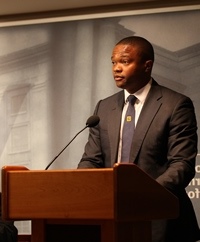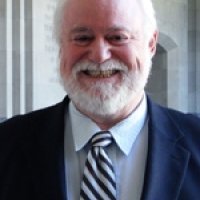Impacting the Future: Luvuyo Mandela’s Perspective
Luvuyo Mandela, Social Entrepreneur, delivered a keynote address on South Africa's story of struggle, hope, trial & error, and lessons learned. While South Africa has come a long way from the days of apartheid and oppression, and possesses a promising future, this generation feels the pressure to be a beacon of democracy, peace, and inclusion on the continent and for the world. Theirs is a task to maintain the positive momentum that will move the country forward. The youth are key to bringing this future to fruition and through active and engaged citizenship South Africa's promise can be realized.
Overview
“We need to take stock of how far we’ve come, the mistakes we have made and prepare each other to be stronger leaders in tomorrow.”- Luvuyo Mandela
An Inspiration for Africa
The South Afri can story is one that inspires and provides hope for the entire continent said Johnny Moloto, deputy chief of mission at the South African Embassy. Moloto stated that South Africa is “regarded as a beacon of hope in the areas of social justice, human rights as well as equality.” Moloto acknowledged that this is an immense responsibility, but affirms that at the dawn of its democracy, South Africa embraces this role.
can story is one that inspires and provides hope for the entire continent said Johnny Moloto, deputy chief of mission at the South African Embassy. Moloto stated that South Africa is “regarded as a beacon of hope in the areas of social justice, human rights as well as equality.” Moloto acknowledged that this is an immense responsibility, but affirms that at the dawn of its democracy, South Africa embraces this role.
Progress Hindered by Inequality
South Africa has made veritable progress since transitioning from an apartheid government to a democratically inclusive state. Millions of people who had been excluded from the provision of basic services now have access to fundamentals like education, housing, and security. The poverty rate has declined and the average income has grown steadily. However, social and economic disparities in South Africa persist. The legacy left behind by apartheid still lingers on the South African landscape. South Africa has abysmal levels of education, which disproportionately impact the black population. Large swaths of the youth population have the feeling that society is working against them. Some youth believe their futures are being marginalized and society is not equipping them with the tools necessary to succeed in an increasingly complex global environment. Moloto explained that “To accelerate progress, deepen democracy, and build a more inclusive society, we need to translate political emancipation into economic well-being for all. This means that we need to focus a lot more on growing the economy in order to realize the fruits of the democratic dividend.”
Unity is Strength
“We are working towards a present that is better than the past and a tomorrow that will be better than today,” said Johnny Moloto. The country needs a new generation of leaders who are ready to take the reins of responsibility, and “also provide innovative solutions to address the growing expectations of their fellow citizens and beyond.” The National Development Plan (NDP), established in August 2013, provides a long-term vision for where the country should strive to be in 2030. Such initiatives set out a constellation for South Africa.
Mandela’s Example
 For Luvuyo Mandela, South Africa has elevated a handful of iconic figures, but the people have lost sight of the movement and struggle that gave birth to those leaders. As a result, the country has a generation that prioritizes individual success over that of the group. Mandela quoted his great-grandfather “In judging our progress as individuals, we tend to concentrate on external factors such as one’s social position, influence and popularity, wealth and standard of education... but internal factors may be even more crucial in assessing one’s development as a human being: humility, purity, generosity, absence of vanity, and readiness to serve others.” Mandela used the example of his elder to demonstrate that the youth are capable of initiating change and having a durable impact on their country and the international community. He attributes Nelson Mandela’s success to a combination of three important details. Firstly, the “relatively humble rural village beginnings he rose from.” Secondly, the great mentorship and tutelage he received throughout his life. And finally, he benefited from an incredible support system from his peers. For the younger Mandela, these 3 aspects shed light on how his great-grandfather became the man celebrated and adored today, who was able to “turn the privilege of freedom around.”
For Luvuyo Mandela, South Africa has elevated a handful of iconic figures, but the people have lost sight of the movement and struggle that gave birth to those leaders. As a result, the country has a generation that prioritizes individual success over that of the group. Mandela quoted his great-grandfather “In judging our progress as individuals, we tend to concentrate on external factors such as one’s social position, influence and popularity, wealth and standard of education... but internal factors may be even more crucial in assessing one’s development as a human being: humility, purity, generosity, absence of vanity, and readiness to serve others.” Mandela used the example of his elder to demonstrate that the youth are capable of initiating change and having a durable impact on their country and the international community. He attributes Nelson Mandela’s success to a combination of three important details. Firstly, the “relatively humble rural village beginnings he rose from.” Secondly, the great mentorship and tutelage he received throughout his life. And finally, he benefited from an incredible support system from his peers. For the younger Mandela, these 3 aspects shed light on how his great-grandfather became the man celebrated and adored today, who was able to “turn the privilege of freedom around.”
For a Brighter Tomorrow
 JP Landman, Public Policy Fellow at the Wilson Center, noted a certain degree of modesty in the other speakers’ discourses. He stated that “it is a good starting point to acknowledge that the past is the past, but there is still a lot more to be done. We need to continue to ask ourselves a question: How can we, as a nation develop a bigger ambition?” Landman charged that South Africa’s path is not necessarily predestined for success. Though the political transition went well, that does not mean that all political transitions will, in effect, follow the same course. “This generation has to be ambitious to do better and achieve more than what has been achieved so far.”
JP Landman, Public Policy Fellow at the Wilson Center, noted a certain degree of modesty in the other speakers’ discourses. He stated that “it is a good starting point to acknowledge that the past is the past, but there is still a lot more to be done. We need to continue to ask ourselves a question: How can we, as a nation develop a bigger ambition?” Landman charged that South Africa’s path is not necessarily predestined for success. Though the political transition went well, that does not mean that all political transitions will, in effect, follow the same course. “This generation has to be ambitious to do better and achieve more than what has been achieved so far.”
Moloto stated that there needs to be an increase in the investment in the youth and that if proper investments are made, they will bring about fresh ideas and new entrepreneurship. Also, with a cognizance of the past, this generation of young South Africans has the tools required to affect change, “We are hopeful that the past holds lessons from which we can learn.”
Luvuyo called on young South Africans to continue the work of the elders. In his view, the South African story is not perfect and the different spheres of society need to come together to ask difficult questions of their leaders. “We need to take a look at how far we’ve come and look at the mistakes we have made.”
Speakers
Hosted By

Africa Program
The Africa Program works to address the most critical issues facing Africa and US-Africa relations, build mutually beneficial US-Africa relations, and enhance knowledge and understanding about Africa in the United States. The Program achieves its mission through in-depth research and analyses, public discussion, working groups, and briefings that bring together policymakers, practitioners, and subject matter experts to analyze and offer practical options for tackling key challenges in Africa and in US-Africa relations. Read more
Thank you for your interest in this event. Please send any feedback or questions to our Events staff.











